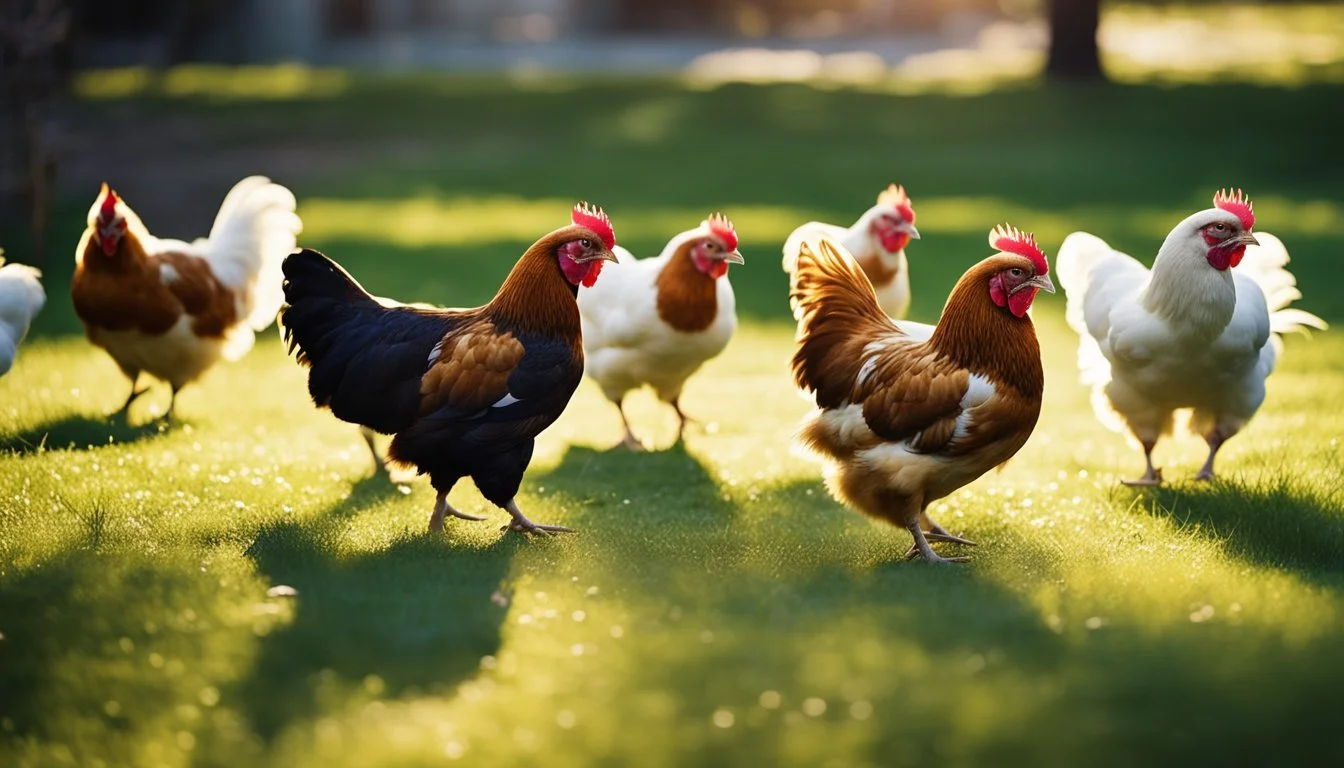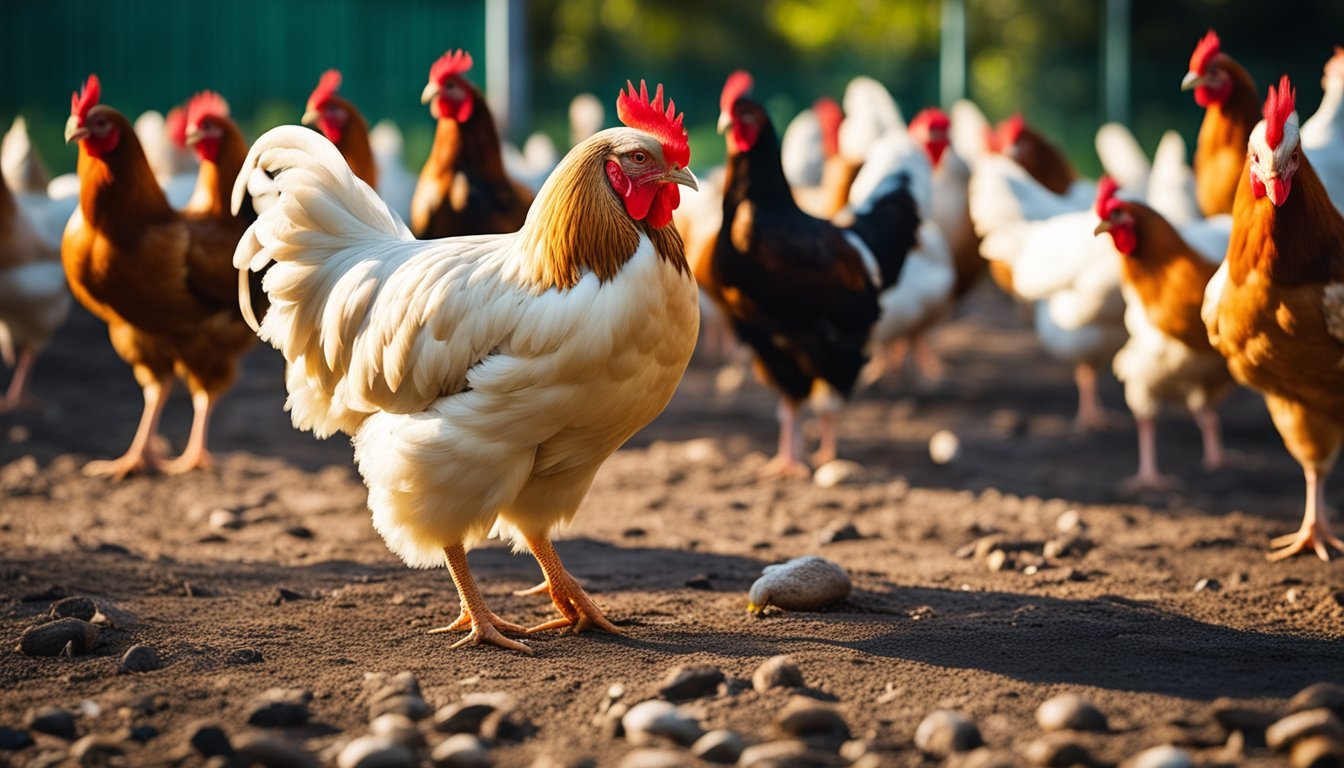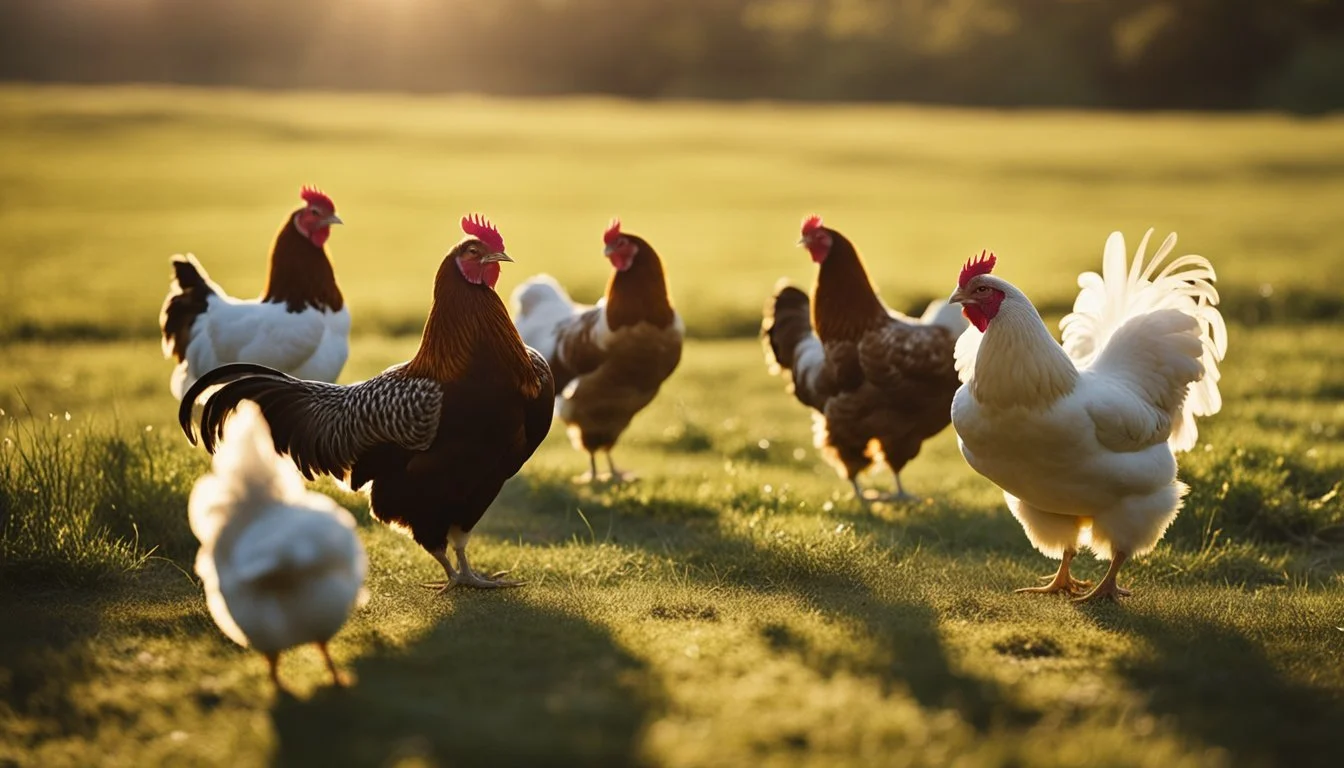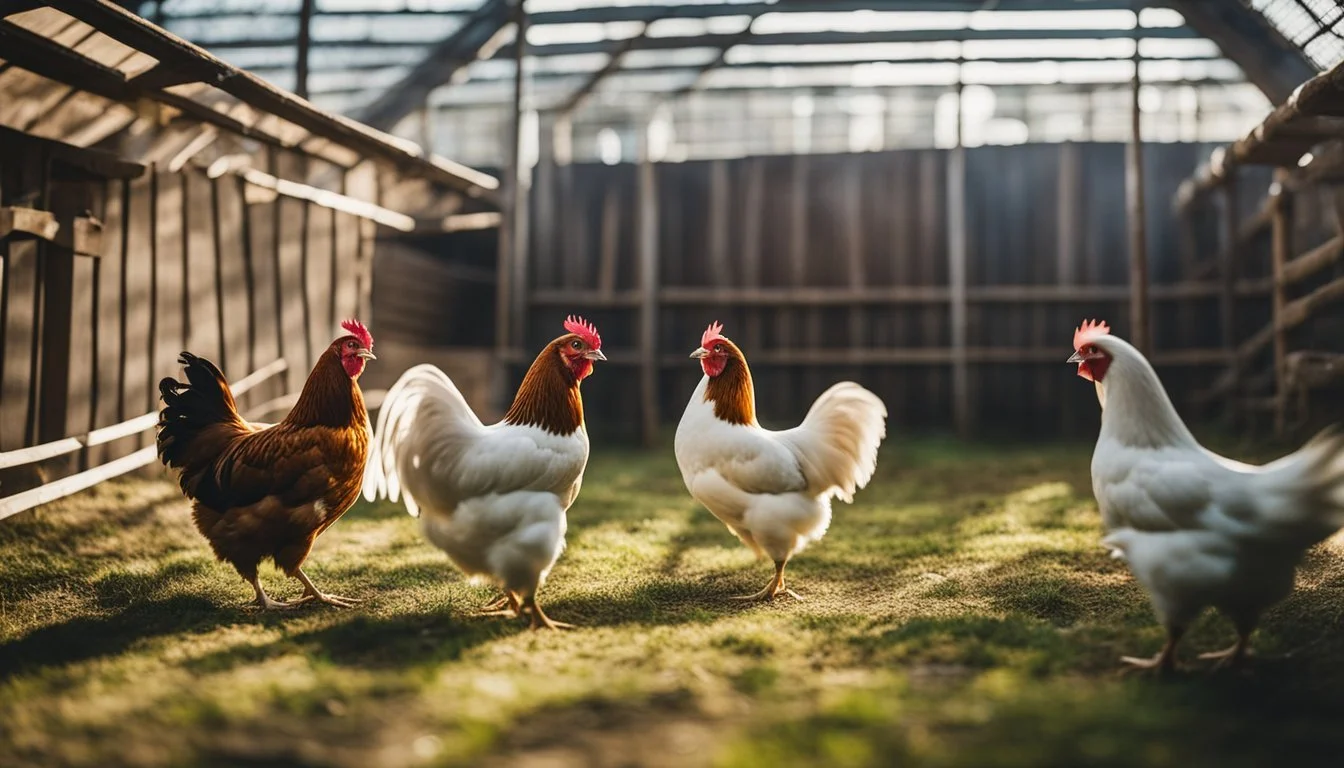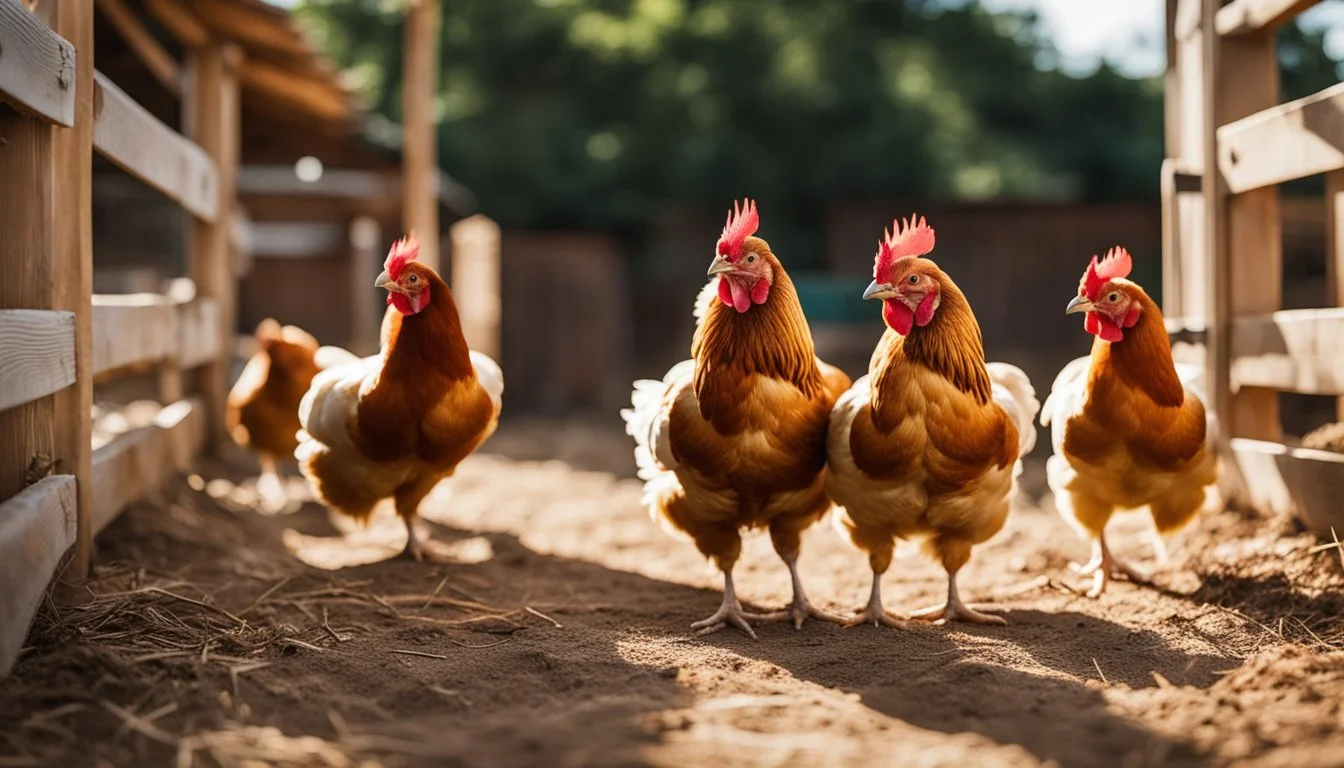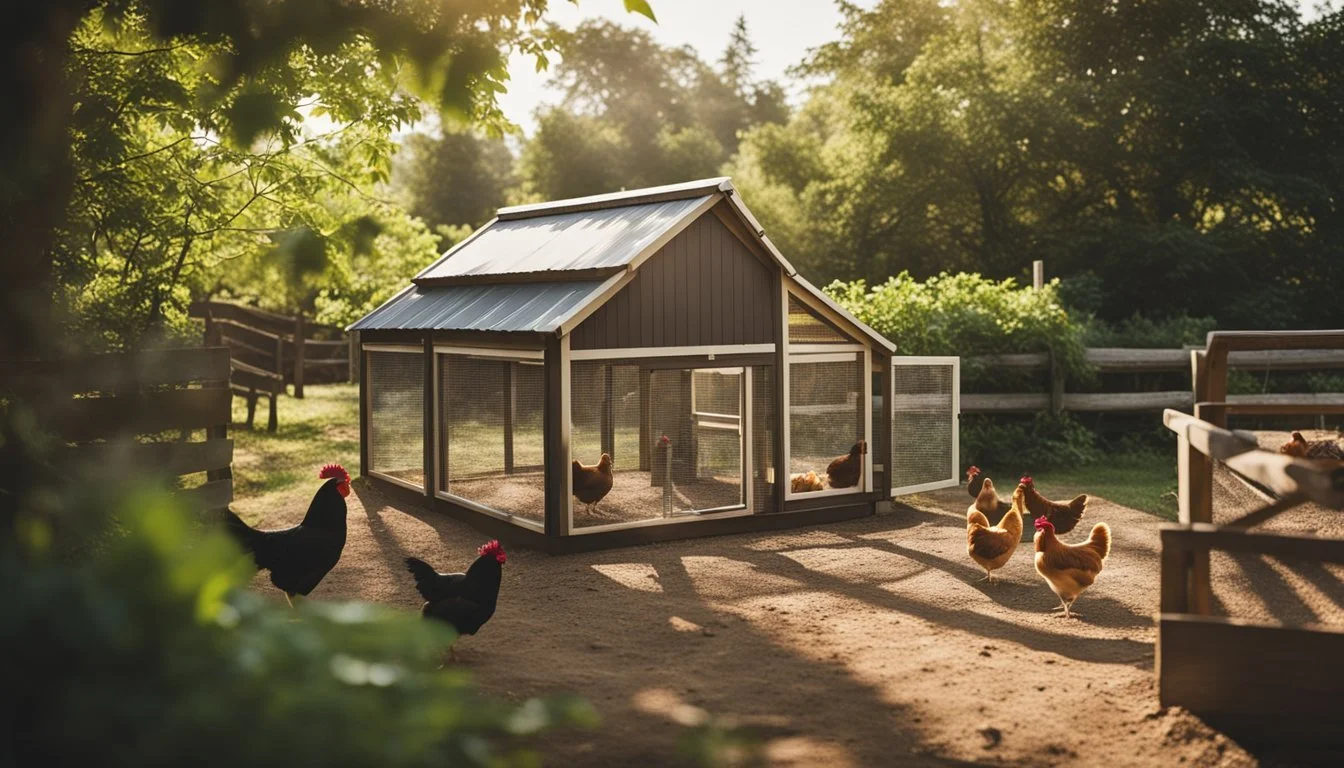8 Signs of a Happy Chicken
Understanding Poultry Well-being
Keeping a flock of chickens can be both a rewarding and enjoyable experience, but ensuring their well-being is crucial. Chickens, like any other pets, have specific needs that must be met for them to thrive. Understanding what makes chickens happy can lead to healthier and more productive animals, thus enhancing the overall experience for the caretaker.
Identifying these signs can help chicken owners maintain a well-balanced environment for their birds. This article will explore eight key indicators that your chickens are happy and in good health. Knowing what to watch for will help you promptly address any issues, ensuring your flock remains content and productive.
1) Bright Comb and Wattles
A bright, vibrant comb and wattles are one of the most visible indicators of a happy and healthy chicken.
These fleshy areas on a chicken's head are important for several reasons. They help regulate body temperature and are also indicative of general health.
Chickens with deep red, full combs and wattles typically show they are receiving proper nutrition and hydration.
Bright combs and wattles suggest good blood circulation, which is a sign of good health and vigor.
Pale or discolored combs and wattles can indicate issues such as anemia or illness.
Therefore, observing the color and condition of a chicken's comb and wattles can provide valuable insights into their health status.
2) Active and Energetic
A happy chicken is often seen engaging in various activities throughout the day. They might be scratching the ground, pecking at feed, or chasing after insects. Such behaviors indicate their curiosity and natural instincts at play.
High energy levels in chickens can be observed through their participation in dust baths. These activities not only keep them clean but also serve as a form of entertainment and relaxation.
Another sign of an active and energetic chicken is their quick response to their environment. They may run to greet their owner or swiftly move to explore new areas of the coop or yard. This responsiveness is a good indicator of their well-being.
Active chickens are usually more interactive. They might be seen socializing with other chickens, signaling a healthy flock dynamic. Encouraging this behavior through a stimulating environment and proper nutrition can maintain their energy levels.
3) Glossy Feathers
Healthy chickens typically have glossy feathers that shine in the light. This is a clear indicator of their good health. Feathers play a crucial role in a chicken's life by providing insulation and protection against environmental elements.
When a chicken's feathers are vibrant and smooth, it often reflects a well-balanced diet and lack of disease. Poor feather quality, on the other hand, may signal nutritional deficiencies or parasitic infestations.
Chickens regularly preen their feathers, distributing oils from their preen gland, which helps maintain their sheen. Active preening is a good sign that birds are in good spirits and paying attention to their grooming.
Moulting is the natural process where chickens shed old feathers and grow new ones. During this time, feathers might lose their gloss temporarily. Once moulting concludes, new glossy feathers should appear, indicating the chicken's return to full health.
4) Clear Eyes
Healthy, happy chickens have clear, bright eyes that are free from discharge. Their eyes should be clear and shiny, with no signs of cloudiness or abnormal redness.
Cloudy or dull eyes can often indicate health problems, such as infections or nutritional deficiencies.
Clear eyes not only suggest good health but also signal that the chicken is alert and active. Chickens rely on their vision to forage, navigate their environment, and avoid predators. Thus, maintaining clear eyes is crucial for their daily activities and overall well-being.
When observing chickens, take note of their eye movements and responsiveness. Quick, sharp eye movements and active inspecting of their surroundings often suggest a healthy and content bird.
If you notice any irregularities, it is important to consult a veterinarian promptly to address potential health issues. Regular check-ups and good hygiene practices, such as keeping the coop clean and dust-free, can help ensure your chickens remain healthy with clear eyes.
5) Curiosity
Happy chickens exhibit a natural curiosity about their surroundings. They will explore their environment, pecking at interesting objects, and investigating new areas. This curiosity indicates they feel safe and secure.
Active exploration is a sign of mental stimulation. Chickens will scratch at the ground, search for bugs, and interact with each other in playful ways. These activities show they are engaged and content.
Chickens that are curious often approach humans with interest. They may follow people around the yard or peck at their shoes. This behavior suggests a level of comfort and trust with their caregivers.
When chickens show curiosity, it means they are not experiencing stress or fear. A fearful chicken will tend to hide or stay still, avoiding exploration. Therefore, curiosity is a positive sign of well-being.
6) Eating and Drinking Well
A happy chicken maintains a good appetite and regularly consumes food and water.
Healthy chickens show enthusiasm when feeding. They will actively peck at the ground for insects and seeds and rush to their feeders during meal times.
Proper hydration is also crucial. Chickens frequently visit their water sources throughout the day.
Ensuring fresh water and balanced feed supports their well-being. Watch for changes in their eating or drinking habits, as it may indicate stress or health issues.
Maintain clean water dispensers and provide a diet rich in nutrients.
Good eating and drinking habits contribute to a chicken's overall health, energy levels, and egg production.
7) Dust Bathing
Dust bathing is a crucial behavior for chickens, helping them maintain good hygiene. Chickens use dust baths to control oils on their skin and feathers. This is similar to how humans bathe to stay clean.
Dust bathing helps chickens remove parasites like mites and lice. They roll around in loose, dry materials such as sand, dirt, or peat moss. This process also helps them relax and feel secure.
A proper dust bathing area should be dry and sheltered. Chickens prefer sunny spots, but a location that doesn't get muddy is essential. Providing a shallow container filled with sand or dirt allows chickens to bathe easily.
Encouraging dust bathing supports the chickens' instinctive behavior. It is an indicator of a happy and healthy flock. Regular dust bathing ensures chickens maintain clean and well-groomed feathers.
Chickens usually bathe together, reinforcing social bonds within the flock. Observing them dust bathing can be a sign of their overall well-being. Dust bathing areas should be part of any good chicken coop or run setup.
8) Purring Sounds
Chickens often make a low humming noise when they are content. This sound is similar to a cat's purr and typically occurs when chickens are relaxed.
They may purr while being petted or during sunbathing sessions. This soothing noise indicates that the chicken feels safe and comfortable in its environment.
Not all chickens will purr, but those that do exhibit this behavior are usually very relaxed. It is a positive sign of their overall well-being and happiness.
Listening for purring can help chicken owners gauge their flock's contentment. When a chicken rests in your lap and purrs softly, it's a clear indication of trust and satisfaction.
Behavioral Indicators
Happy chickens often display consistent egg laying and active foraging behaviors, which can signal their overall well-being.
Consistent Egg Laying
A sign of a content and healthy chicken is regular egg production. Happy chickens, given the right conditions, lay eggs consistently. This indicates they’re receiving adequate nutrition, proper care, and a stress-free environment.
Providing a diet rich in calcium and protein is crucial for promoting regular laying. Clean, comfortable nesting boxes and a calm surroundings also support this behavior.
Sudden drops in egg production can signal issues like illness, stress, or changes in environment. Thus, monitoring egg laying patterns can help keep chickens happy and healthy.
Active Foraging
Active foraging is a natural behavior for happy chickens. It involves scratching the ground and searching for food, which helps to fulfill their instinctual needs.
When chickens forage, they often peck and scratch around the yard. This behavior can keep them physically and mentally stimulated. It also contributes to their diet diversity by allowing them to find insects and plants.
A lack of foraging can be a concern. It may indicate boredom, stress, or illness. To encourage this behavior, provide ample space and a variety of foraging materials in their environment.
Physical Health
A happy chicken is often a healthy chicken, evident through specific physical traits. Key indicators include bright eyes, clean feathers, and steady weight maintenance throughout its life.
Bright Eyes and Clean Feathers
Bright, clear eyes are a top indicator of good health in chickens. These eyes should be free from any discharge or cloudiness. Clear eyes suggest the chicken is free from infections or respiratory issues.
Clean feathers are another sign of well-being. Chickens spend a lot of time preening, which helps keep their feathers free from parasites and dirt. Feathers should appear smooth, well-kept, and uniform. Ruffled or missing feathers might indicate stress, poor nutrition, or health problems.
Steady Weight Maintenance
Maintaining a consistent weight is crucial for a chicken's health. Regular weighing can help monitor this. Large fluctuations in weight could signal underlying health issues or nutritional deficiencies.
A balanced diet rich in nutrients supports weight maintenance. Healthy chickens typically have a firm, well-muscled breast and feel robust when picked up. Monitoring weight also helps in adjusting diet to ensure they receive necessary nutrients for overall health and productivity.
Environmental Factors
Proper environmental factors are critical to ensuring chickens live happy and healthy lives. Ensuring they have a comfortable living space and access to clean water are vital components of chicken care.
Comfortable Living Space
A well-organized and clean coop greatly contributes to a chicken's well-being. The living space should be spacious enough to allow chickens to move freely.
Ample ventilation is important to prevent respiratory issues and to reduce ammonia buildup from waste. Coops should have windows or vents that can be adjusted based on weather conditions.
Bedding, such as straw or wood shavings, helps absorb moisture and provides comfort. Bedding must be changed regularly to keep the environment sanitary.
Perches are essential, allowing chickens to roost comfortably. Each chicken needs about 8-10 inches of perch space to sleep without crowding.
Additionally, nesting boxes should be provided, with around one box for every 3-4 hens. This ensures hens have a private space to lay eggs, which reduces stress.
Access to Clean Water
Clean, fresh water is indispensable for the health of chickens. Waterers should be filled daily and kept free from contaminants such as dirt, droppings, and algae.
The placement of waterers should be strategic—elevating them slightly can prevent debris from contaminating water. In hot weather, adding ice can help maintain a cool temperature.
Automatic waterers can be an efficient way to ensure a steady supply of fresh water. In freezing temperatures, water heaters are beneficial to prevent the water from freezing.
Monitoring water consumption is crucial, as a decrease can indicate health problems. Ensuring water is always accessible helps maintain hydration and aids in digestion.


